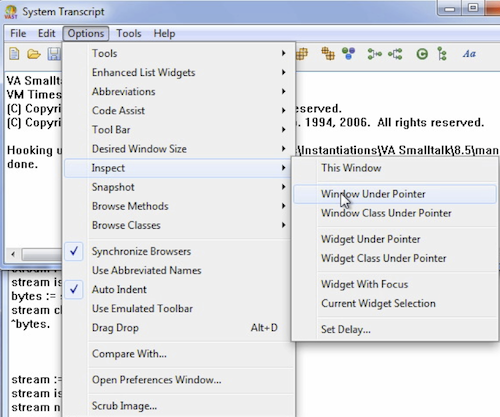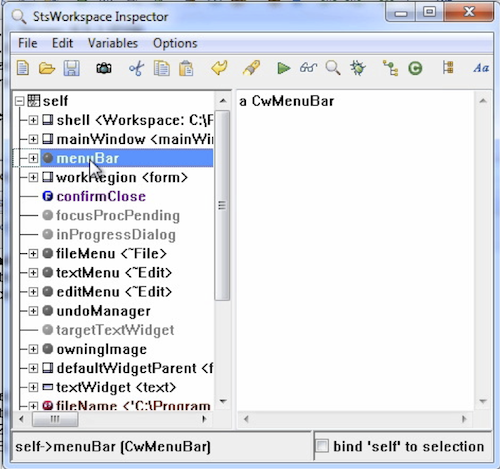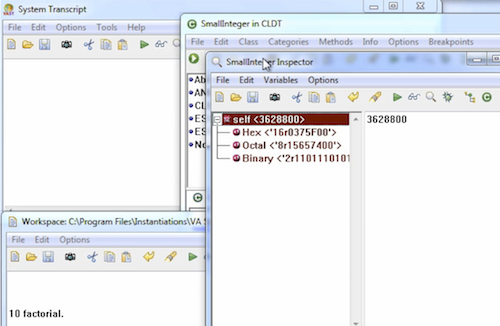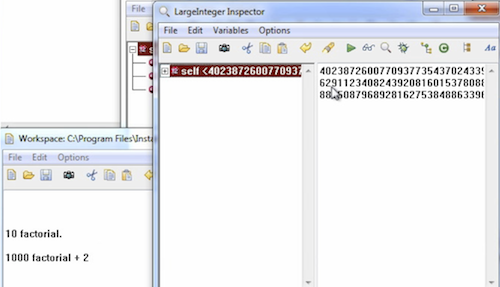Pharo at fOSSa
At the fOSSa Open Source Conference this year (Dec 4, 5, 6 in Lille), there will be a Pharo workshop.
Technorati Tags: pharo, open source
The author of this blog, James Robertson, passed away in April 2014. This blog is being maintained by David Buck (david@simberon.com).
At the fOSSa Open Source Conference this year (Dec 4, 5, 6 in Lille), there will be a Pharo workshop.
Technorati Tags: pharo, open source
Ask a question, get the answer - that's what happened in this thread, where there's a nice, concise example shown using PetitParser for JSON.
Today's Smalltalk 4 You looks at a nifty little feature of VA Smalltalk - the menu options that make it easy to inspect arbitrary objects in VA. If you have trouble viewing it here in the browser, you can also navigate directly to YouTube. To watch now, click on the image below:
If you have trouble viewing that directly, you can click here to download the video directly. If you need the video in a Windows Media format, then download that here.
You can also watch it on YouTube:
During Smalltalk development, it's quite common to want to inspect arbitrary objects - and sometimes, it's not that easy to "dig into" the right level of the application for that. Fortunately, tools to deal with that are right in the VA environment. Take a look at the "Options" menu in the launcher:

Notice the "Delay" option - if you want to inspect a widget (one of the options), you can set a countdown to give yourself time to get the cursor to it. Try that, and move the mouse to the toolbar for the launcher:

This is a really useful thing - where I work, using VisualWorks, we've built similar tools into the environment. In VA, they are already there.
Need more help? There's a screencast for other topics like this which you may want to watch. Questions? Try the "Chat with James" Google gadget over in the sidebar.
Technorati Tags: smalltalk, va smalltalk, inspecting
Enclosures:
[st4u297-iPhone.m4v ( Size: 2278517 )]
What do you do after you take down a bunch of guards? Stash them in the guard post, of course:

Technorati Tags: dishonored

|
Today's Javascript 4 You looks at a simpler map overlay - a defined polygon. If you have trouble viewing it here in the browser, you can also navigate directly to YouTube. Join the Facebook Group to discuss the tutorials. You can view the archives here. |
To watch now, click on the image below:
If you have trouble viewing that directly, you can click here to download the video directly. If you need the video in a Windows Media format, then download that here.
You can also watch it on YouTube:
Technorati Tags: javascript, maps
Enclosures:
[js4u213-iPhone.m4v ( Size: 1454509 )]
Today's Smalltalk 4 You looks at some the basic tools in ObjectStudio. Since OS is built on top of VisualWorks, some of those tools are VW tools, and someof them are unique to OS. If you have trouble viewing it here in the browser, you can also navigate directly to YouTube. To watch now, click on the image below:
If you have trouble viewing that directly, you can click here to download the video directly. If you need the video in a Windows Media format, then download that here.
You can also watch it on YouTube:
Technorati Tags: smalltalk, objectstudio
Enclosures:
[st4u296-iPhone.m4v ( Size: 3806664 )]
Welcome to episode 94 of Independent Misinterpretations - a Smalltalk and dynamic language oriented podcast with James Robertson and David Buck.
This week we have an interview with Mark Roos about Rtalk - a Smalltalk implementation built on top of the JVM. This one is far from experimental - it's in production use. If you want to see some of the talks Mark has given about Rtalk, you can visit the Oracle media site:
You can subscribe to the podcast in iTunes (or any other podcatching software) using this feed directly or in iTunes with this one.
To listen now, you can either download the mp3 edition, or the AAC edition. The AAC edition comes with chapter markers. You can subscribe to either edition of the podcast directly in iTunes; just search for Smalltalk and look in the Podcast results. You can subscribe to the mp3 edition directly using this feed, or the AAC edition using this feed using any podcatching software. You can also download the podcast in ogg format.
If you like the music we use, please visit Josh Woodward's site. We use the song Troublemaker for our intro/outro music. I'm sure he'd appreciate your support!
If you have feedback, send it to jarober@gmail.com - or visit us on Facebook - you can subscribe in iTunes using this iTunes enabled feed.. If you enjoy the podcast, pass the word - we would love to have more people hear about Smalltalk!
Enclosures:
[im98.m4a ( Size: 15935016 )]
Welcome to episode 94 of Independent Misinterpretations - a Smalltalk and dynamic language oriented podcast with James Robertson and David Buck.
This week we have an interview with Mark Roos about Rtalk - a Smalltalk implementation built on top of the JVM. This one is far from experimental - it's in production use. If you want to see some of the talks Mark has given about Rtalk, you can visit the Oracle media site:
You can subscribe to the podcast in iTunes (or any other podcatching software) using this feed directly or in iTunes with this one.
To listen now, you can either download the mp3 edition, or the AAC edition. The AAC edition comes with chapter markers. You can subscribe to either edition of the podcast directly in iTunes; just search for Smalltalk and look in the Podcast results. You can subscribe to the mp3 edition directly using this feed, or the AAC edition using this feed using any podcatching software. You can also download the podcast in ogg format.
If you like the music we use, please visit Josh Woodward's site. We use the song Troublemaker for our intro/outro music. I'm sure he'd appreciate your support!
If you have feedback, send it to jarober@gmail.com - or visit us on Facebook - you can subscribe in iTunes using this iTunes enabled feed.. If you enjoy the podcast, pass the word - we would love to have more people hear about Smalltalk!
Enclosures:
[im98.mp3 ( Size: 11382334 )]
I was a little wary about getting Dishonored
for my Windows 7 VM (I have a 13" Macbook pro, 2011 vintage). The minimum specs for the game call for a 3.0 Ghz Core Duo, and this machine has 2.4 Ghz Core Duo - and it's a VM, after all. Then again, the game uses Unreal 3, just like Mass Effect 3 does - and ME3 ran just fine for me. So I pulled the trigger on Steam, and tried it out - and it runs fine (better than Deus Ex: HR, actually). With that out of the way, I can enjoy the game as I travel away from my Xbox :)
As good as A-Rod is in the regular season, he's awful in the post - he's never been able to come up with the clutch hits in playoff games. So this news - Girardi benching him for game 5 - is good stuff.
Technorati Tags: yankees
Today's Smalltalk 4 You looks at integer math in Smalltalk - noting that you don't ever need to worry (outside of database issues, of course) about the small/large integer divide. If you have trouble viewing it here in the browser, you can also navigate directly to YouTube. To watch now, click on the image below:
If you have trouble viewing that directly, you can click here to download the video directly. If you need the video in a Windows Media format, then download that here.
You can also watch it on YouTube:
Today we'll look at how integer math works in Smalltalk - specifically, the fact that you don't ever need to worry about "big ints". As a simple example, let's calculate a small factorial 10.

Now let's try something big, and add a small number to it:
1000 factorial + 1
Display the result gives you a LargeInteger object - demonstrating that you simply do not need to worry about this level of "type" information in Smalltalk - it's handled for you:

Need more help? There's a screencast for other topics like this which you may want to watch. Questions? Try the "Chat with James" Google gadget over in the sidebar.
Technorati Tags: malltalk, va smalltalk, math
Enclosures:
[st4u295-iPhone.m4v ( Size: 2095904 )]

|
Today's Javascript 4 You looks at adding animated map markers to a map. If you have trouble viewing it here in the browser, you can also navigate directly to YouTube. Join the Facebook Group to discuss the tutorials. You can view the archives here. |
To watch now, click on the image below:
If you have trouble viewing that directly, you can click here to download the video directly. If you need the video in a Windows Media format, then download that here.
You can also watch it on YouTube:
Technorati Tags: javascript, maps
Enclosures:
[js4u212-iPhone.m4v ( Size: 1615471 )]
Today's Smalltalk 4 You looks at customizing the seeds used in random number generation in VA Smalltalk. If you have trouble viewing it here in the browser, you can also navigate directly to YouTube. To watch now, click on the image below:
If you have trouble viewing that directly, you can click here to download the video directly. If you need the video in a Windows Media format, then download that here.
You can also watch it on YouTube:
Today we'll look at customizing the seeds used in random number generation by class EsRandom in VA Smalltalk. First, have a look at the #new method:
new "Use linear congruential generator, with a shuffling array. Reference: Numerical Recipes in C, The Art of Scientific Computing Press et al., Cambridge University Press 1990, pp. 211, 212" | randomStream | randomStream := super new. randomStream seed2: Time millisecondClockValue asFloat; basicNext; shuffleArray: (Array new: randomStream shuffleSize). 1 to: randomStream shuffleSize do: [ :index | randomStream shuffleArray at: index put: randomStream basicNext]. randomStream seed1: randomStream seed2. ^randomStream
Notice how the seeds are set? That's likely good enough for most uses, but if you wanted to customize, all you need to do is replace those seeds - maybe like the following:
| randomStream | randomStream := EsRandom new. randomStream seed2: AbtTimestamp now asMicroseconds asFloat; basicNext; shuffleArray: (Array new: randomStream shuffleSize). 1 to: randomStream shuffleSize do: [ :index | randomStream shuffleArray at: index put: randomStream basicNext]. randomStream seed1: randomStream seed2. Transcript show: (randomStream nextInt: 100) printString. Transcript cr. Transcript show: (randomStream nextInt: 10) printString. Transcript crThat will work fine - try it out for yourself. That's really all there is to it!
Need more help? There's a screencast for other topics like this which you may want to watch. Questions? Try the "Chat with James" Google gadget over in the sidebar.
Technorati Tags: smalltalk, va smalltalk, random
Enclosures:
[st4u294-iPhone.m4v ( Size: 1906635 )]
I would like to introduce you Phobos - the XULRunner based Smalltalk framework for development of native GUI with standard look&feel for Linux, Mac OS X and Windows. It is based on Zinc, WebSockets and Seaside continuations. For more information including more screenshots see the project page